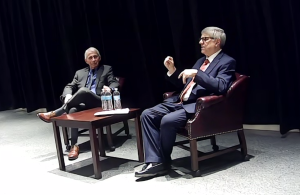Anthony Fauci reflected on surprising changes throughout his career at a Georgetown University Medical Center (GUMC) event April 9.
The event is part of the Distinguished Scientist Seminar Series, which features researchers and medical professionals in a broader effort to connect medical students with leaders in the field. Fauci — former director of the National Institute of Allergy and Infectious Diseases, former chief medical advisor to President Joe Biden and a current distinguished university professor at GUMC — narrated his experiences working alongside activists during the AIDS epidemic, contextualizing such efforts in terms of his broader career trajectory.
Fauci cautioned students that their careers may not unfold exactly according to their plans, but said the unexpected directions in which his career went presented incredible opportunities from surprising places.
“I did not always want to be a researcher. I think my career trajectory is a good example of what I tell students and fellows and residents — as much as you plan your career, at least in medicine and science, it is almost never linear,” Fauci said at the event.
Fauci said that, though his main goal during medical residency was to return to New York City, his experience at a fellowship for the National Institute of Health (NIH) helped him discover his interest in researching diseases.
“I really got attracted to the concept of research where you’ve been studying disease and you make an observation and have it not only impact the individual patient you’re seeing, but if you make a discovery that can benefit a lot of people, you write it up and physicians throughout the country, if not the world, use it,” Fauci said.

After Fauci and his colleagues at the NIH helped develop a treatment regimen for vasculitis, a condition in which blood vessels swell and change blood flow patterns, his career took on an entirely new trajectory. Previously, vasculitis killed roughly 80% of those afflicted with it.
Fauci said he credits the nine years he spent working on vasculitis as a potential reason for his abrupt shift to AIDS research in the early 1980s, but said that those around him — including his mentor, Shelly Wolfe — cautioned him against moving away from his previous work.
“I remember when I told him what I was going to do, he looked at me like I was crazy,” Fauci said. “He said, ‘Do me a favor: Don’t give up your day job, because this is not going to last very long.’”
AIDS, an immune system disease caused by HIV, makes the body more susceptible to other conditions or diseases. Despite an effective treatment regimen, there is currently no known cure.
The U.S. AIDS epidemic, which lasted from 1981 through the early 1990s, primarily affected gay and bisexual men and resulted in more than 100,000 deaths. The disease was heavily stigmatized as many spread misinformation that falsely purported only men who had sex with men were able to contract HIV, prompting a surge in activism surrounding public health policy.
Fauci said members of the LGBTQ+ community initially criticized him for his handling of the disease, but he later became a respected ally after listening to the activists around him.
“The federal government, including me, was approaching HIV from the classical, antiquated approach of the scientific and regulatory community that they know what’s best for the patient and we’re not really interested in any input from the patient because we’ll know better,” Fauci said.
“However, they were dealing with a brand new disease that was killing all of their friends, and they wanted to have some say in loosening up the regulatory and clinical trial entry and exclusion criteria, and they wanted to have a seat at the table,” he added.
According to Fauci, listening to activists contributed an important human element to his work and positively impacted his future work.
“I decided to put aside the theatrics, put aside the confrontative behavior and actually listen to what these exclusively young, angry and frightened, sick gay men were saying. And when I was listening to what they were saying, it made absolutely perfect sense. I came to the conclusion that, if I were in their shoes, I would be doing exactly what they were doing. So I started to listen to them,” Fauci said.
“They were really young, outstanding people, leaders in their community. It’s a really important lesson about keeping an open mind and listening to people,” he added.








